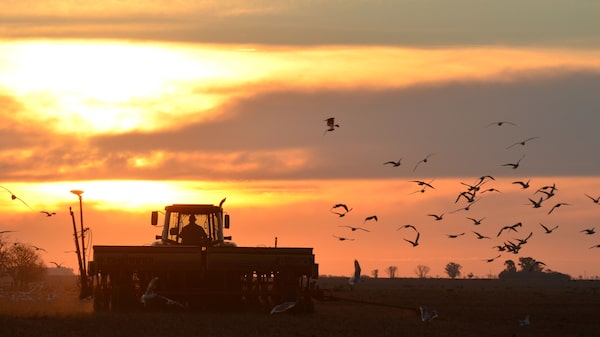Bloomberg — Argentina’s looming recession will be deeper than first expected as one of the worst droughts in recent memory ravages crucial farm exports.
Gross domestic product in South America’s second-largest economy, which desperately needs US dollars, will shrink 3% this year, worse than the previous forecast for a 1.5% contraction. That’s according to new forecasts by Itau Unibanco Holding SA and Buenos Aires-based consulting firm EconViews.

“It’s really bad,” said Andres Borenstein, chief economist at EconViews. “The supply of dollars is going to be very scarce.”
The Rosario Board of Trade slashed its soybean production estimate on Wednesday night by another 22% and warned of further cuts. The new figure of 27 million metric tons would be the smallest harvest in 15 years.
Soy and corn plants on the Pampas crop belt are in yield-defining growth stages, a time when they most need water, but instead there’s no let-up in the dryness compounded by vicious heat waves.
“Argentina is suffering a climate scenario that’s without precedent in modern agricultural history,” Rosario analysts led by Cristian Russo wrote. “There’s no weather event on the horizon that allows us to put floors under yields or under the acreage that simply won’t get harvested.”
Argentina is the world’s biggest supplier of soy meal for livestock feed and soy oil for cooking and biofuels, and the third-biggest corn provider.
The country is depending on these export revenues, worth tens of billions of dollars in a normal year, to shore up hard-currency reserves at a time when it’s scrambling to meet targets in the country’s $44 billion program with the International Monetary Fund. Harvest season in the second quarter is also a key driver of the economy, which is already struggling in other sectors and headed toward recession.
The government on Wednesday even granted exporters a delay to corn shipments to help them meet commitments to global buyers and to ensure there’s feed for domestic poultry and livestock.
The drought has gone on for so long that it has produced back-to-back disasters — a parched wheat harvest last year and now the frazzled soy and corn crops. That’s fueling fears that many farmers will be unable to rescue the crop investment cycle and go bankrupt.
Ripple effects will spread through the economy, Borenstein said. There’ll be less trucking and shipping, for instance, slashing road and river toll revenues and hurting businesses along these major thoroughfares.
A shortage of crop dollars flowing into central bank coffers could well impact how many imports the government authorizes for industries beyond farming, he added.
“The problem is in the real economy,” Borenstein said. “A lot of people in the manufacturing or construction sectors will be short of inputs as a result of the drought.”
Read more on Bloomberg.com



